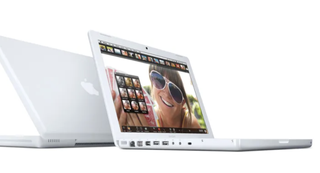As if to temper the cries of “but what are you doing for Sustainability Week, Tim?” across the internet, Mr. Cook’s behemoth recently filed a patent for uniform battery enclosures – something that might match across your iPhone, your wireless keyboard and your wireless mouse, say – that could allow us to routinely swap batteries between our iOS devices.
If Apple‘s idea makes it to market, the tech is a solid step towards a more modular, sustainable, planet friendly future, although it’s important to note it is an application, rather than a granted patent – and according to stats from Insights, the Cupertino giant files literally thousands of those per year.
I applaud any push for a future in which we’ll be replacing just one small part of our Apple product, rather than canning the whole thing and buying again. You can probably sense there’s a ‘but’ coming though…
Interchangeable batteries for monitors and so on are a noble idea, but how often have you mused: “I wish I could remove my MacBook Air‘s battery and use it to charge my iPad”? Now, how often have you thought to yourself: “I wish my AirPods Pro 2 batteries didn’t start deteriorating so fast”?
If the second statement resonates, we speak the same language, friend.
Back to the patent application titled ‘battery charging system and mobile and accessory devices’ (first spotted by Apple Insider) for a minute though. It features images depicting standardized slots and a relatively traditional-looking battery pack
– a cuboid core, an outer shell, two sensor terminals, positive and negative core terminals at the end – ready to slip into a cell phone, a monitor, a wireless keyboard and a wireless mouse.
Sadly, no headphones or earbuds are mentioned in the filing and for me, that’s the number one Apple item sorely in need of a better shelf life.
User replaceable Mac batteries are only ‘new’ if you were born after 2009
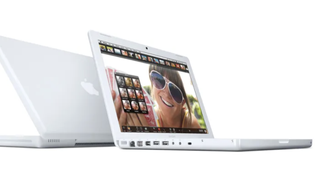
Replaceable batteries are hardly a groundbreaking idea. I can’t be alone in remembering the deep joy of getting a new Nokia 3310 phone up and running in 1999. It’s a task that included releasing a fresh 1,450mAh battery from its little plastic wallet, whipping the back of the handset off with a quick upward flick of the wrist, lining up the three contacts, sliding in the power pack, squishing the whole thing back together again, flipping it back to the screen and firing it up. Just me? And if the 3310’s stamina ever dipped (it rarely did; that phone lasted for days) you could simply buy another battery pack and do it yourself. Many of us popped a spare in our rucksacks if we knew we’d be camping at a music festival. Those halcyon days…
If you want to try it today, there’s always the 2022 issue Nokia 5710 XpressAudio, which comes with Bluetooth earbuds built into the back or the August 2023 Nokia 130 and 150, all of which sport the self-same 1,450mAh replaceable battery.
That wasn’t the case with the original 2007 iPhone though, was it? In fact, no iPhone has ever come with a battery we get to load in (and update) ourselves; the last time Apple gave us the option of a user replaceable battery in any of its products was 15 years ago, in the 2009 Apple MacBook.
Light-powered charging for earbuds exists – so can’t Apple fix it for AirPods?
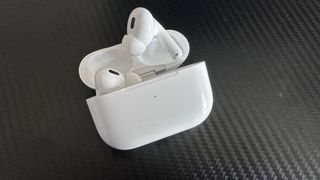
Can you imagine how many ice-white Apple earbuds have found their way into landfill since they burst onto the scene in December 2016?
I can do better than that – I’ll give you an educated estimate. According to Statista, between 2017 and the end of 2022, Apple sold 391 million pairs of AirPods, which means sales figures are now well over 400 million units (and then some). It’s also safe to assume that the 110 million pairs sold between 2017 and the end of 2019 have now passed on to the great big gig in the sky. Why? Because the unpalatable truth is that your AirPods have a finite lifespan (which I’ll explain fully later), owing to the batteries that power them.
But AirPods can be recycled, right – so they won’t all be in landfill? I reached out to Apple over this, because it has been suggested that perhaps it wouldn’t be financially viable for Apple to actually repurpose old AirPods as part of its Recycling Program, when safely opening the driver housings to extract their delicate components is a skilled task requiring actual human hands, rather than machines. So let’s clear that up.
Apple responded to my query regarding what happens to an AirPod when a customer uses its recycling program with some useful background information, telling me, “Components of AirPods are separated by our recyclers and recycled. Our Material Recovery Lab in Austin, TX, is dedicated to discovering innovative recycling solutions across Apple’s products.”
Apple’s entire response is as follows:
“Apple AirPods Pro (2nd Gen) are better for the environment.
– AirPods Pro are designed with numerous materials and features to minimise their impact on the environment, including the use of 100% recycled rare earth elements in all magnets and 100% recycled gold in the plating of multiple printed circuit boards. The case also uses 100% recycled tin in the solder of the main logic board and 100% recycled aluminium in the hinge. AirPods Pro (2nd generation) are free of potentially harmful substances such as mercury, BFRs, PVC, and beryllium.
– Redesigned packaging eliminates the outer plastic wrap, and 90 percent or more of the packaging is made using fibre-based materials, bringing Apple closer to its goal of completely removing plastic from all packaging by 2025.
– AirPods are built to be long-lasting, if a customer ever has an issue, they should visit an Apple store or an authorised service provider or call Apple Care for assistance.
– If a customer is having issues with their AirPod’s battery and it is no longer under warranty, the battery service option allows a customer to have each AirPod serviced for a cost.
– Through our battery program for AirPods, we’ll replace the user’s AirPods and then send the previous ones back to a facility where we can make sure they are properly recycled.
– Components of AirPods are separated by our recyclers and recycled. Our Material Recovery Lab in Austin, TX, is dedicated to discovering innovative recycling solutions across Apple’s products.
– As with all of our products, we work closely with our recyclers to ensure AirPods are properly recycled and provide support to recyclers outside of our supply chain as well.
– Although AirPods do not qualify for trade-in value, they are accepted as part of the recycling program for free. You can take your old small electronic equipment such as smartphones, tablets, computers or batteries to any Apple Store and we’ll recycle them responsibly and free of charge.
– AppleCare+ for Headphones which includes AirPods provides up to two years of expert technical support and hardware coverage for AirPods, including unlimited incidents of accidental damage protection, each subject to an excess fee of £25 (or $29)”.
So, although the various plastics in your AirPods are not biodegradable (they simply won’t go back to nature), Apple says it is making great strides here. Now, Apple’s earbuds aren’t alone in that people might be throwing them away rather than using Apple’s recycling solutions, (other true wireless plastic earphones are available, just see our best earbuds and best noise-cancelling earbuds buying guides), but unlike Apple, certain top manufacturers are implementing more planet-friendly charging systems in a bid to avoid recycling programs – because ideally, their innards wouldn’t expire.
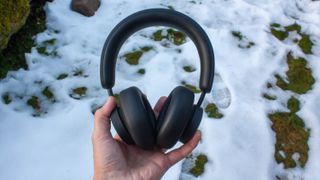
Case in point: Urbanista’s relationship with Powerfoyle, which started making headlines back in 2021 as the future of sustainable sound. Powerfoyle is a material developed in partnership with sustainable energy company Exeger, which converts any light – from both outdoors and indoors, ie. from the sun and from lightbulbs – into energy that can power our electronics. And the ideal user case is true wireless headphones.
“With headphones charged by light, we resolve a major pain point that consumers feel about their batteries not being charged,” Anders Andreen, CEO of Urbanista, said nearly three years ago, adding, “more importantly, we shift the energy consumption into sustainable energy”.
To date, the Urbanista Malibu, the Urbanista Los Angeles (pictured above) and Urbanista Phoenix (the first ever light-powered earbuds) all use Powerfoyle for charging – and there are also Powerfoyle-toting options from House of Marley, Adidas’ RPT-02 SOL and Philips’ A6219 GO too. So what on this, Apple?
Apple’s representative told me that Apple never talks about its future plans/unreleased products, so there’s nothing to share there. And fair enough – we can still hope.
Here’s why AirPods don’t last – and why we need to rethink our outlook
As I previously noted, Apple has sold well over 400 million pairs of AirPods to date. And all of those will expire. I don’t like it (I’m an audio specialist; I write about this stuff every day and the AirPods Pro 2 are a very talented set of earbuds) but the fact remains: even your $249 / £249 / AU$399 AirPods Pro 2 will give up the ghost, sooner or later.
How long do AirPods last precisely? Honestly, it’s a tough call, because factors such as how often you use them, how frequently you charge them (which is actually as detrimental to battery health as leaving them plugged in overnight is – we know this from our phones, don’t we?), whether you get them especially sweaty at the gym, how often you make calls or listen with ANC (both of which drain the battery rather quickly, thus requiring more charging) and even how often you clean your earbuds all affect a battery’s longevity.
Make no mistake though, the batteries in your AirPods and earbuds will deteriorate over time. You can treat your AirPods with all the due care and respect in the world to eke as much life out of them as possible, but you cannot stop their inexorable demise any more than you can halt the passing of time. Why? A layer of crystalline buildup will slowly coat the tiny lithium-ion battery’s inside walls, thus increasing electrical resistance. Over time, the result is a reduction in the amount of charge said batteries are able to hold, even at 100% capacity. On top of this, the batteries in your earbuds lose charge over time just by sitting there. Ever found an old pair of earbuds in a pocket and found they no longer switch on when you flip the case? That.
Again, Apple isn’t alone here, this is an issue with the batteries found in every set of true wireless earbuds I’ve tested to date.
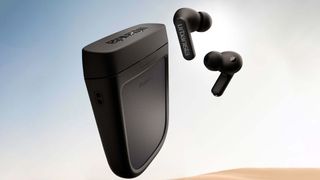
Why aren’t more companies jumping on the Powerfoyle bandwagon and sidestepping batteries all together? In our largely glowing four-star review of the Urbanista Los Angeles, we quipped, “don’t doubt the efficacy of the charging system here. Or how smug it’ll make you feel”, so believe us when we tell you that in headphones, it works.
Of course, profit margins are always an issue, but size is too. The reason earbuds manufacturers opt for rechargeable, non-replaceable batteries is almost certainly as simple as ‘it makes the earbuds smaller’. I’m as guilty as the next person when it comes to seeking out the best earbuds for small ears – my current pick for the best earbuds for my own bijou ears is the Sony LinkBuds S. A quick glance at the Urbanista Phoenix shows that the case is where the solar/ambient light panel is, and said case is not small…
Ultimately, we need to have a rethink, people. It’s too easy to throw out your dying earbuds, select a new set and think no more on it. We need to ask ourselves how much we want ever-smaller, ever cuter ‘fast fashion’ style earbuds and how much we want a sustainable future – for our listening gear and for future generations.
You may also like
Services Marketplace – Listings, Bookings & Reviews
